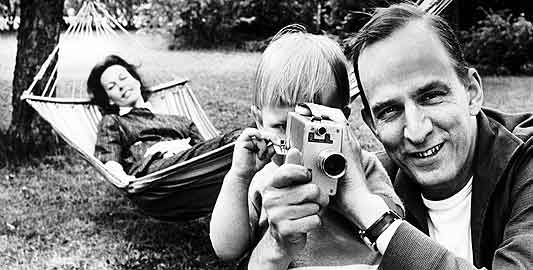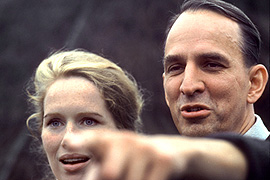Film-maker Ingmar Bergman dead
The Swede was one of the most influential film directors of the 20th century.

 |
| A photo from the 1960s shows Bergman teaching his son Daniel how to handle a camera while Kibi Laretai, Bergman’s wife and mother of Daniel, watches [AFP] |
Ingmar Bergman, the Swedish film director widely regarded as one of the great masters of modern cinema, has died. He was 89.
Astrid Soderbergh Widding, president of The Ingmar Bergman Foundation, confirmed the death on Monday.
Keep reading
list of 4 itemsInside the pressures facing Quebec’s billion-dollar maple syrup industry
‘Accepted in both [worlds]’: Indonesia’s Chinese Muslims prepare for Eid
Photos: Mexico, US, Canada mesmerised by rare total solar eclipse
Bergman died at his home on the Baltic islet of Faro, north of the tourist island of Gotland, Sweden, said Eva Bergman, one of his nine children.
The cause of his death was not immediately known.
Melancholy works
Bergman inspired a generation of film-makers with his often stark and melancholy works including the films Wild Strawberries, Scenes From a Marriage and Fanny and Alexander.
He made about 60 films before retiring from film-making in 2003.
 |
| Bergman and actress Liv Ulmann at a theatre rehearsal in Stockholm in the ’60s [AFP] |
“He was one of the great ones,” Jorn Donner, who produced Fanny and Alexander, said.
Richard Attenborough, the British actor and director, said: “The world has lost one of its very greatest film-makers. He taught us all so much throughout his life.”
His cinematic masterpieces often dwelt on sexual confusion, loneliness and the vain search for the meaning of life, themes that many ascribed to a traumatic childhood in which he was beaten by his father.
He won Oscars for best foreign language film in 1960, 1961 and 1983, and a collection of his work was added last month to the Unesco store of history’s greatest archives.
Fanny and Alexander won four Oscars alone in 1983 and in total Bergman’s work included 54 films, 126 theatre productions and 39 radio plays.
Cinema as literature
In his films, Bergman’s vision encompassed all the extremes of his beloved Sweden: the claustrophobic gloom of unending winter nights, the gentle merriment of glowing summer evenings, and the bleak magnificence of the island where he spent his last years.
Bergman approached difficult subjects such as plague and madness with inventive technique and carefully honed writing, becoming one of the towering figures of serious film making.
“He was one of the world’s biggest personalities. There were [Japanese film director Akira] Kurosawa, [Italy’s Federico] Fellini and then Bergman. Now he is also gone,” Bille August, an academy award winner, said.
Laurent Delmas, a French cinema specialist, said France’s national cinema school required aspiring students to analyse a five-minute extract from a Bergman film as part of last year’s entrance exams.
“There is not a serious French director out there who has not watched Bergman and taken elements – consciously or unconsciously – from him,” Delmas said.
“They watched Bergman not to ape him but because they were blown away by the essential subjects of his films – death, relationships – by his stories and the way he filmed them.”
Gilles Jacob, the Cannes Film Festival’s director, called Bergman the “last of the greats, because he proved that cinema can be as profound as literature”.
Severe discipline
The son of a Lutheran clergyman and a housewife, Ernst Ingmar Bergman was born in Uppsala on July 14, 1918, and grew up with a brother and sister in a household of severe discipline that he described in painful detail in the autobiography The Magic Lantern.
 |
| Bergman encouraged young directors not to make any films without a message [AFP] |
The title comes from his childhood, when his brother got a “magic lantern” – a precursor of the slide-projector – for Christmas.
Ingmar was consumed with jealousy, and he managed to acquire the object of his desire by trading it for a hundred tin soldiers.
The apparatus was a spot of joy in an often-cruel young life. Bergman recounted the horror of being locked in a closet and the humiliation of being made to wear a skirt as punishment for wetting his pants.
He broke with his parents at 19 and remained aloof from them, but later in life sought to understand them.
The story of their lives was told in the television film Sunday’s Child, directed by his own son Daniel.
Wives and lovers
Bergman’s private life often thrust him into the headlines as much as his films.
He was married five times to beautiful and gifted women and had liaisons with his leading actresses.
In a rare interview in 2001 Bergman said personal demons tormented and inspired him throughout his life.
“The demons are innumerable, appear at the most inconvenient times and create panic and terror,” he said at the time.
“But I have learnt that if I can master the negative forces and harness them to my chariot, then they can work to my advantage.”
International attention
Bergman first gained international attention with 1955’s Smiles of a Summer Night, a romantic comedy that inspired the Stephen Sondheim musical, A Little Night Music.
His last work was Saraband, a made-for-television film that aired on Swedish public television in December 2003.
Nearly a million Swedes – or one in nine – watched the family drama, which was based on the two main characters from his previous TV series, Scenes From a Marriage.
 |
|
A ’70s photo shows Bergman, left, with Sven |
The show starred Liv Ullmann and Erland Josephson – two of Bergman’s favourite actors – who reprised their roles from Scenes From a Marriage, which was edited and released as a feature film in 1974.
The Seventh Seal, released two years later, riveted critics and audiences.
An allegorical tale of the medieval Black Plague years, it contains one of cinema’s most famous scenes – a knight playing chess with the shrouded figure of Death.
“I was terribly scared of death,” Bergman said of his state of mind when making the 1957 film, which was nominated for an Academy Award in the best picture category.
The film distilled the essence of Bergman’s work – high seriousness, flashes of unexpected humour and striking images.
Stage director
Though best known internationally for his films, Bergman was also a prominent stage director.
He worked at several playhouses in Sweden from the mid-1940s, including the Royal Dramatic Theatre in Stockholm which he headed from 1963 to 1966.
He staged many plays by the Swedish author August Strindberg, whom he cited as an inspiration.
Marie Nyrerodand, a Swedish journalist, said on Monday that Bergman died peacefully during his sleep.
After a hip surgery in October last year, Bergman never fully recovered, she told Swedish broadcaster SVT.
“Since then I don’t think he really recuperated. They made sure he had company around the clock to help him get up with a broken hip,” Nyrerod, who had interviewed him often, said.